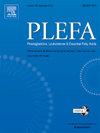Effect of omega-3 LCPUFA supplementation on maternal fatty acid and oxylipin concentrations during pregnancy
IF 3.2
4区 医学
Q3 BIOCHEMISTRY & MOLECULAR BIOLOGY
Prostaglandins, leukotrienes, and essential fatty acids
Pub Date : 2020-06-23
DOI:10.1101/2020.06.22.20137851
引用次数: 4
Abstract
INTRODUCTION Omega-3 long chain polyunsaturated fatty acids (LCPUFA) have been associated with a reduction in risk for preterm birth. However, there is limited understanding of how fatty acids and their bioactive derivatives (oxylipins) change over the course of pregnancy. Here we document the changes in concentration of fatty acids and oxylipins during pregnancy and how fatty acid status and oxylipin concentrations are affected by supplementation with omega-3 LCPUFA. We also investigate the degree to which fatty acid and oxylipin changes across pregnancy are influenced by baseline omega-3 status. MATERIALS AND METHODS We profiled the fatty acids in all lipids in dried blood spots (total blood fatty acids) by gas chromatography and free (unesterified) fatty acids and their associated oxylipins in separate dried blood spot samples by LC-MS-MS collected from a random sample of 1263 women with a singleton pregnancy who participated in the ORIP (Omega-3 fats to Reduce the Incidence of Prematurity) trial. ORIP is a double-blind, randomized controlled trial involving 5544 participants and designed to determine the effect of supplementing the diets of pregnant women with omega-3 LCPUFA on the incidence of early preterm birth. Maternal whole blood finger prick samples were collected at baseline (~14 weeks gestation) and at completion of the study intervention period (34 weeks gestation). RESULTS The concentration of most total and free polyunsaturated fatty acids and their associated oxylipins declined over the course of pregnancy. Omega-3 LCPUFA supplementation increased total DHA and 7-HDHA and mitigated the decline in free DHA, 4-HDHA and 14-HDHA. The intervention had minimal or no effect on free EPA, LA, AA and their associated oxylipins. Omega-3 LCPUFA supplementation in women with higher omega-3 status at baseline was associated with a significant increase in 7-HDHA and 4-HDHA between the treatment and control whereas there were no differences between groups in 7-HDHA and 4-HDHA in women with intermediate or lower baseline omega-3 status. CONCLUSION Our data suggest a differential response with or without omega-3 supplementation for DHA and DHA-derived oxylipins, which may have an important role to play in modulating pregnancy duration. Further work is needed to understand their role, which may allow us to better tailor omega-3 supplementation for preterm birth prevention.孕期补充omega-3 LCPUFA对母体脂肪酸和氧脂浓度的影响
omega -3长链多不饱和脂肪酸(LCPUFA)与早产风险降低有关。然而,对脂肪酸及其生物活性衍生物(氧脂类)在怀孕过程中如何变化的了解有限。在这里,我们记录了怀孕期间脂肪酸和氧化脂素浓度的变化,以及补充omega-3 LCPUFA对脂肪酸状态和氧化脂素浓度的影响。我们还研究了脂肪酸和氧化脂在怀孕期间变化的程度受到基线omega-3状态的影响。材料与方法我们通过气相色谱法分析了干血斑中所有脂质的脂肪酸(总血脂肪酸),并通过LC-MS-MS分析了单独干血斑样本中的游离(未酯化)脂肪酸及其相关的氧脂素,这些样本随机收集了1263名参加ORIP (Omega-3脂肪降低早产发生率)试验的单胎妊娠妇女。ORIP是一项涉及5544名参与者的双盲、随机对照试验,旨在确定在孕妇饮食中补充omega-3 LCPUFA对早期早产发生率的影响。在基线(妊娠~14周)和研究干预期结束(妊娠34周)采集产妇全血手指穿刺样本。结果在妊娠期间,大多数总多不饱和脂肪酸和游离多不饱和脂肪酸及其相关的氧脂类浓度下降。补充Omega-3 LCPUFA增加了总DHA和7-HDHA,减轻了游离DHA、4-HDHA和14-HDHA的下降。干预对游离EPA、LA、AA及其相关的氧化脂质的影响很小或没有影响。Omega-3 -3基线水平较高的妇女补充LCPUFA与治疗组和对照组之间7-HDHA和4-HDHA的显著增加有关,而在基线水平中等或较低的妇女中,7-HDHA和4-HDHA在两组之间没有差异。结论:我们的数据表明,补充或不补充omega-3对DHA和DHA衍生的氧化脂质的反应不同,这可能在调节妊娠持续时间方面发挥重要作用。需要进一步的工作来了解它们的作用,这可能使我们能够更好地为预防早产量身定制omega-3补充剂。
本文章由计算机程序翻译,如有差异,请以英文原文为准。
求助全文
约1分钟内获得全文
求助全文
来源期刊
CiteScore
6.40
自引率
6.70%
发文量
60
审稿时长
13.2 weeks
期刊介绍:
The role of lipids, including essential fatty acids and their prostaglandin, leukotriene and other derivatives, is now evident in almost all areas of biomedical science. Cell membrane behaviour and cell signalling in all tissues are highly dependent on the lipid constituents of cells. Prostaglandins, Leukotrienes & Essential Fatty Acids aims to cover all aspects of the roles of lipids in cellular, organ and whole organism function, and places a particular emphasis on human studies. Papers concerning all medical specialties are published. Much of the material is particularly relevant to the development of novel treatments for disease.

 求助内容:
求助内容: 应助结果提醒方式:
应助结果提醒方式:


